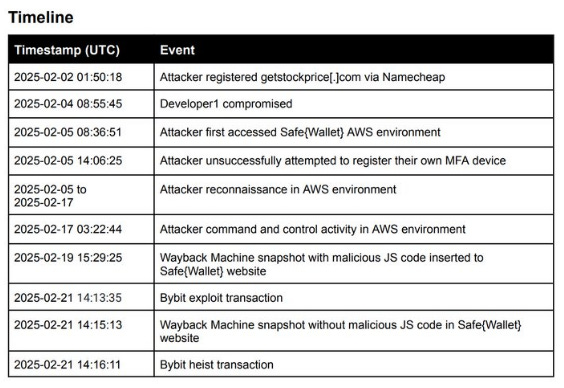Inside Crypto’s Largest Heist
One compromised laptop. Nineteen days of meticulous planning. Then $1.4 billion vanished in seconds.
On February 21, North Korean hackers orchestrated the largest cryptocurrency theft in history, draining Bybit exchange of 401,346 Ethereum. The digital bank robbery began with an innocent Docker project opened by a Safe Wallet developer.
The FBI has confirmed what cybersecurity experts suspected: North Korea's elite hacking squad TraderTraitor executed the heist with surgical precision.
The Modus Operandi
February 4: Hackers compromise a developer's MacOS system through a malicious Docker project
Attackers hijack AWS session tokens, bypassing multi-factor authentication
Malicious JavaScript infiltrates Safe Wallet's infrastructure
February 21st: With a few keystrokes, $1.4 billion in Ethereum disappears
"We present these findings in the spirit of transparency," Safe Wallet wrote in its forensic report.
The Money Trail
The stolen fortune hasn't vanished completely. Blockchain analysts are locked in a high-stakes chase with the thieves.
77% of funds—approximately $1.07 billion—remain traceable on blockchain networks. But the hackers are moving quickly, funnelling hundreds of thousands through Bitcoin mixers like Wasabi Wallet and Cryptomixer.
Bybit has offered bounties totalling $140 million for information leading to frozen assets.
This isn't North Korea's first crypto heist, but it's by far their largest. Since 2017, the isolated nation has stolen over $3 billion in cryptocurrency, funding weapons programmes while circumventing international sanctions.
Read: Crypto's Biggest Heist Rocks Bybit 🦹🏻♂️
Previous record-holder, the $615 million Ronin Network hack in 2022, now looks almost quaint by comparison.
Industry Aftershocks
The breach defeated multiple security layers—peer reviews, monitoring systems, independent audits, and limited privileged access—proving no system is invulnerable.
Safe Wallet's response has been comprehensive.
Full infrastructure reset with credential rotation
External access lockdown and enhanced firewall rules
Improved malicious transaction detection with Blockaid
Comprehensive real-time threat monitoring
Temporary disablement of native hardware wallet signing
"The act of signing the transaction itself currently is the last line of defence. This is not just a user and education problem—it is an industry-wide issue that demands collective action." Safe Wallet warned, calling for industry-wide action to improve Web3 security
As $1.4 billion in digital assets hangs in the balance, the Bybit hack forces the crypto world to confront an uncomfortable reality: in the digital age, a single compromised laptop can trigger a billion-dollar catastrophe.





